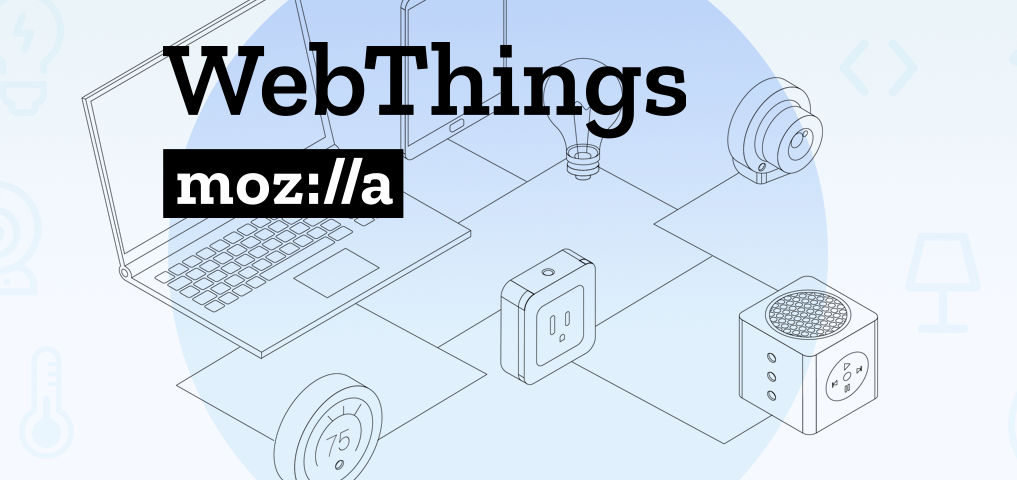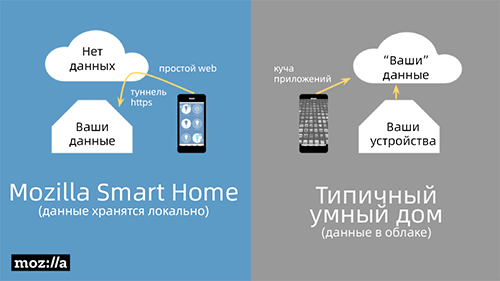Data Privacy, IoT and Mozilla WebThings
- Transfer

- The user becomes dependent on a particular vendor, because devices can not communicate with each other outside the same manufacturer;
- Vendors use user data at their discretion, leaving no choice for the user;
- Centralization makes a user more vulnerable since millions of users become vulnerable immediately after a hacker attack.
Mozilla conducted a study in which they found:
- Some users are willing to sacrifice data privacy for comfort;
- Most are used to collecting data about them, and are surprised when this does not happen;
- A significant part of users would like to abandon surveillance, but they have no choice.
Mozilla is developing its smart home standard, and encourages everyone to go for decentralization and isolation. Their WebThings gateway does not collect any data at all, and can work completely autonomously.
Further details, links, results of research of Mozilla will go.
Smart home devices help make life a little easier, but at the same time they require the transfer of control over your information to their manufacturing companies for work. In a recent article by the New York Times Privacy Project about protecting privacy online, the author recommended buying IoT devices only when the user “is ready to sacrifice some privacy for the sake of convenience”.
This is reasonable advice, since the companies that manage smart home devices know that you are at home, not only when you tell them yourself. Soon they will use constantly turned on microphones and listen to literally every one of your sneezes , and then offer you cold medicine from their affiliated providers. Moreover, requiring the transfer of data and processing logic only on their servers reduces the interoperability of different platforms. Leading companies will select from consumers the opportunity to choose the technologies that they need.
At Mozilla, we believe that the user must have control over their devices and the data that these devices generate. You must own the data, you must control where they go, you must be able to make changes to your profile if it is not compiled accurately .
Mozilla WebThings follows privacy at the architecture level , a set of principles from Dr. Ann Cavoukian , which take into account the privacy of user data throughout product design and development. We offer an alternative approach to the Internet of things, which will basically be private and will return users control over their data.
User Attitude for Privacy and IoT
Before we look at the architecture of WebThings, let's talk about what users think of privacy in the context of smart home devices, and why it is so important to give people the opportunity to take responsibility.
Today, when you buy a “smart home” device, you get a convenient opportunity to control and monitor your home via the Internet. You can turn off the lights at home while in the office. You can check if the garage door is still open. Previous studies have shown that users passively (and sometimes actively) agree to exchange privacy for the convenience of managing a home. When the user has no choice of alternative to convenience in exchange for loss of privacy, he is reluctant, but agrees to such an exchange.
However, although people buy and use smart home devices, this does not mean that they are comfortable living with such a status quo. One recent user survey showed that nearly half (45%) of 188 owners of smart homes were concerned about the privacy or security of their devices .
User Survey Results
In the fall of 2018, our research team conducted a diary-based study in which 11 users from the United States and the United Kingdom participated. We wanted to find out how convenient and practical our WebThings project is. We gave each member of Raspberry Pi with pre-installed WebThings 0.5 and several smart devices.
Smart devices issued to study participants
We observed (on the spot or through video chat) how each of the participants went through the entire installation and configuration of the “smart home” . Then we asked the participants to keep a diary to document their interaction with the smart home, as well as to take into account the problems that arose in the process. Two weeks later, we talked with each participant about their impressions. Several participants who were new to the smart home concept were thrilled with IoT's ability to streamline routine tasks; some were disappointed with the lack of reliability of some devices. The impressions of the rest were somewhere in the middle: users wanted to create more complex algorithms and rules, they wanted an application on a smartphone to receive notifications.
In addition, we learned about user attitudes towards data collection. To our surprise, all 11 participants were firmly convinced that we were collecting data about them . They have already learned to expect such data collection, since it is such a model that prevails in most platforms and online services. Some of the participants felt that data was being collected for quality improvement or for research purposes. However, upon learning that no data was being collected about them, two of the participants expressed relief - they had one less reason to worry about the misuse of their data in the future.
On the contrary, there were participants who were not at all worried about data collection: they believed that companies were not interested in such insignificant information as turning a bulb on or off. They did not see the consequences of how the data collected could be used against them. This showed us that we should better demonstrate to users what outsiders can learn from the data from your smart home . For example, it is not difficult to establish when you are not at home, using data from the door sensor.
Door sensor logs can show when someone is not at home
From this study, we learned what people think about the privacy of the data that smart homes generate. And at the same time, in the absence of an alternative, they are ready to sacrifice privacy for the sake of comfort. And some do not worry about privacy without seeing the long-term negative effects of data collection. We believe that confidentiality should be a right for everyone , regardless of socio-economic status or technical skills. Now we will tell how we do it.
Decentralized data management gives users privacy
Smart home device manufacturers have designed their products to provide them more services than customers. Using a typical IoT stack in which devices cannot easily interact, they can build a reliable picture of user behavior, preferences and actions from the data they collected on their servers.
Take a simple example of a smart light bulb. You buy a light bulb and download the application for your smartphone. You may need to configure the unit for transferring data from the light bulb to the Internet and, possibly, set up a “subscription to a cloud user account” from the light bulb manufacturer to control it at home or remotely. Now imagine five years later when you install dozens or hundreds of smart devices - household appliances, energy-saving devices, sensors, security systems. How many applications and accounts will you have by then?
The current operating model requires that you transfer your data to manufacturing companies for the proper operation of your devices. This, in turn, requires that you only work with the devices and services of these companies - in some kind of fenced reserves .
Mozilla's solution returns data to users. Mozilla WebThings does not have a company's cloud servers that store data from millions of users. User data is stored in the user's home. Backups can be stored anywhere. Remote access to devices comes from one interface. The user does not need to install many applications, and all data is tunneled through a private subdomain with HTTPS encryption, which the user creates .
The only data that Mozilla receives is when a subdomain checks our server for WebThings updates. The user may not give devices access to the Internet at all and manage them completely locally.
The decentralization of WebThings gateways means that each user has their own “data center”. The gateway becomes the central nervous system of the house. When data about smart devices of users is stored at their place, it becomes much more difficult for hackers to get access to a lot of data of users at once. A decentralized approach provides two main advantages: complete confidentiality of user data, and reliable storage for the best-in-class encryption https .
The figure below compares Mozilla's approach with that of a typical smart home device manufacturer.
Comparison of Mozilla's approach to a typical smart home manufacturer
Mozilla's approach provides users with an alternative to current offers, providing them with data privacy and the convenience of IoT devices.
Further decentralization efforts
In developing Mozilla WebThings, we deliberately isolated users from servers that could collect their data, including our own Mozilla servers, by offering a compatible, decentralized IoT solution. Our decision not to collect data is an integral part of our mission and additionally takes into account the long-term interest of our organization in the field of new decentralization technologies as a means of increasing user assistance.
Webthings has embodied our mission to treat personal safety and privacy on the Internet as a fundamental right, returning power back to users. From Mozilla’s point of view , decentralized technologies can destroy centralized “authorities” and return more rights to users themselves .
Decentralization may be the result of social, political and technological efforts to redistribute power from a minority to a majority. We can achieve this by rethinking and rebuilding the network architecture. By allowing IoT devices to work on the local network without the need to transfer data to external servers, we decentralize the existing IoT structure.
With Mozilla WebThings, we are creating an example of how a decentralized distributed system through web protocols can affect the IoT ecosystem. Our team has already created a draft API specification for WebThing to support the standardization of web usage for other IoT devices and gateways.
Although this is one way to achieve decentralization, there are complementary projects with similar goals at different stages of development in order to return power to users. Signals from other market players, such as the FreedomBox Foundation , Daplie, and Douglass , indicate that individuals, households, and communities are looking for ways to manage their data independently.
By focusing on people in the first place, Mozilla WebThings gives people a choice : how confidential they want to see their data, and what devices they want to use in their system.
Related publications:
Mozilla WebThings - setting up a
Mozilla WebThings gateway on a Raspberry Pi - getting started
Mozilla has developed an open gateway for the Internet of things




